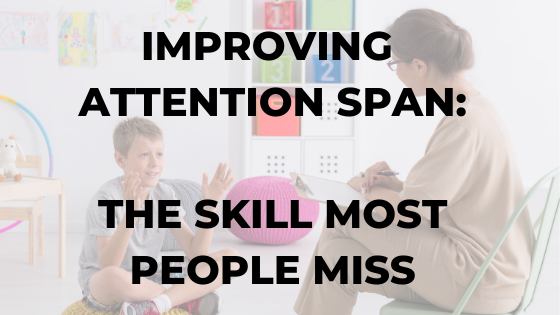Attention issues have gotten more and more prevalent in today’s world.
There’s a lot of information out there about how to improve your child’s attention span.
That can be a lot for parents to sift through-especially when come of the interventions are quite controversial.
What most people don’t realize is that attention is a SKILL.
Which means that you can improve it with practice (Fahy, 2019).
I explain how that’s possible in this video:
Attention is actually one of the 8 executive functioning skills:
- Attending
- Working Memory
- Strategy Planning and Organization
- Initiation
- Inhibition
- Fluency
- Shifting
- Self-monitoring and regulation
I explain in detail what each of these skills are in this free guide.
The bottom line is that we need executive functioning skills to self-manage, do well in school, and function well in adult life.
People who lack executive functioning skills may (Fahy, 2014):
- Need directions repeated multiple times before getting things done or require a lot of reminders and hand-holding.
- Tend to run late or have no sense of time.
- Seem unable to work through the simplest disruptions in their daily routines and apply basic problem-solving skills.
- Get easily thrown off when unexpected things happen.
- Frequently turn assignments in late or lose things.
- Avoid tasks that are challenging and have multiple steps (this could include day-to-day tasks, or it could present in academic tasks).
- Take way longer than is necessary to get things done, or rush through things without proper care.
- Make silly mistakes and seem like they aren’t putting forth a good effort (in school, chores, etc.). For example, when asked to clean their room it’s still a mess an hour later.
- May refuse work or have a low-tolerance for activities that require any sort of effort.
- Be easily distracted and have a hard time controlling impulses (e.g., interrupting, wanting to get up frequently while doing homework, not having a “social filter”).
- Seem unmotivated and unconcerned about the future or anything beyond the present moment.
On the other hand, people with strong executive functioning skills may (Turkstra & Byom, 2010):
![]() Likely to pay attention to important details.
Likely to pay attention to important details.
![]() Do work without reminders and put forth and good effort
Do work without reminders and put forth and good effort
![]() Show a sense of responsibility and reliability.
Show a sense of responsibility and reliability.
![]() Know how to deal with changes to routines or unplanned events.
Know how to deal with changes to routines or unplanned events.
![]() Know how to “think ahead” and come up with multiple options for working through situations (for example, coming up with a “plan B”).
Know how to “think ahead” and come up with multiple options for working through situations (for example, coming up with a “plan B”).
![]() Monitor and evaluate their own behavior.
Monitor and evaluate their own behavior.
![]() Know how to break complex tasks down in to steps so that they know where to start.
Know how to break complex tasks down in to steps so that they know where to start.
![]() Accurately estimate how long a task may take and complete things on time.
Accurately estimate how long a task may take and complete things on time.
![]() Appear organized, efficient, focused, and adaptable. Successful. A go-getter. Reaching their full potential.
Appear organized, efficient, focused, and adaptable. Successful. A go-getter. Reaching their full potential.
On the other hand, people who have strong executive functioning skills are:
There are MANY extremely intelligent, capable kids out there who are underperforming simply because they have underdeveloped executive functioning skills.
But here’s the good news:
Executive functioning is something we can train with practice (Fahy, 2019).
Which means it’s possible for kids to go from underachieving to thriving when they develop the right skills.
The first step to helping kids that need work in this area is learning what the 8 executive functioning skills are and what they look like.
I’ve created a free guide where I outline each of these 8 skills. It’s called “Raising motivated, self-sufficient, organized kids with executive functioning.” You can sign up for a free copy here.
References:
Fahy, J. K. (September, 2019). Relationships between language and executive functions: Planning and regulating. Presentation conducted by ContinuED.
Fahy, J. K. (2014). Language and executive functions: Self-talk for self-regulation. Perspectives on language learning and education, (March, 2014), 61-70. https://doi.org/10.1044/lle21.2.61
Learning Success (December, 2020). 8 key executive functions. Retrieved from: https://www.learningsuccessblog.com/8-key-executive-functions-infograph
Turkstra, L. S., & Byom, L. J. (2010). Executive functions and communication and adolescents. The ASHA Leader, 15. https://doi.org/10.1044/leader.FTR1.15152010.8

